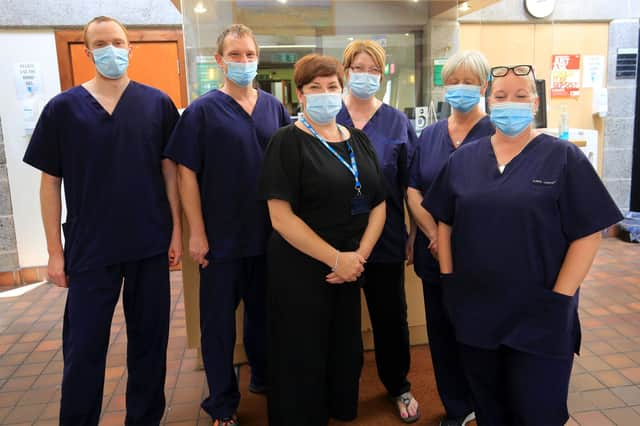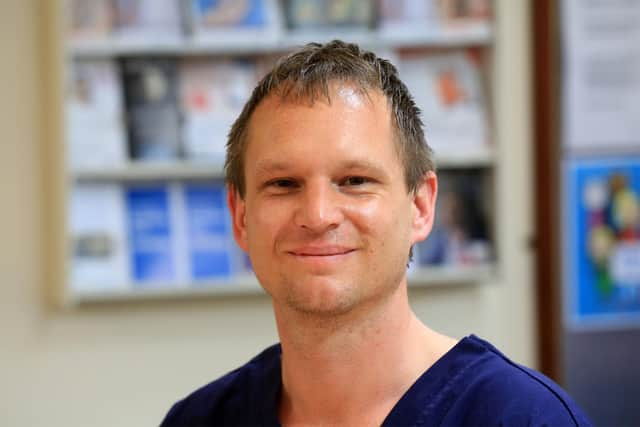"Sheffield GPs love our NHS as much you do"


We love our NHS We don’t love trying to get through on the phone. We’re happy for services to improve. We don’t like being in the dark about the changes. We’ve seen the efficiency of Amazon. Why does the NHS have to be so clunky?
We know our bodies inside out. Has our doctor really heard us? We long to be listened to. But GPs seem so busy. We want the right diagnosis. We also want to feel we matter.
Advertisement
Hide AdAdvertisement
Hide AdWe do want long, healthy lives. But we don’t want pressure to take tablets. We suspect medicines can help. But we’re suspicious of the pharmaceutical companies who tell us so.


We like it when someone solves our problems. Finding solutions within ourselves is tougher. We want to be informed about our health. Why should we feel shamed for turning to Dr Google? We want ‘health care’. But at times it feels we’re getting ‘disease care’.
We want decisions that extend our years. When frailty comes, we need courage to prioritise quality of life instead. We know our bodies matter. But we know our hearts, minds, souls and dreams matter too. We love our NHS. We want it to love us back.
The NHS is both incredible and exasperating. Every day as a GP (at Birley Health Centre) involves grappling with the tensions of health care. We need to guide our patients through all this complexity. I'll be bringing you articles that can help support you to engage with your health and your health care, such as...
Advertisement
Hide AdAdvertisement
Hide AdImproving communication: There is a large difference between the reality of working in General Practice and what the public understands. For example: GP workload; changes to our services; the communication strategies we use in consultation with patients.
Impact of workload: General practice involves the frantic activity of passionate, tired staff. We can’t meet what is expected, including what we expect of ourselves. We care enormously for our patients but at times communicate that we don’t: when you can’t get through on the phone, can't get an appointment or feel rushed when you do. Daily we balance how many patients to help with how much time to give each patient. The increasing workload is not something that patients or doctors can easily control. But the effect of it risks damaging the precious relationship between us. Usually GPs and patients are doing the best they can. We should be on the same team.
Service changes: In order to offer the best care we can with limited resources, we need to make changes to our service. We need to communicate and involve patients in this, or we risk leaving you in the dark. I enjoy discussing issues such as remote consulting, new staff roles you may come across, or services available to you for self-referral or online.
Consultation techniques: Have you had the frustration of ‘one consultation, one problem’? Or been baffled by a doctor asking ‘What do you think is wrong?’ There are many changes that are sprung on patients. I enjoy supporting patients to work with your GP. For example: preparing for your consultation; better understanding what happens during a consultation; helping you get what you need from your appointment.
Advertisement
Hide AdAdvertisement
Hide AdYour feedback: At times General Practice finds it hard to accept criticism. We can empty ourselves for our patients, and still be told ‘you are not good enough’. The results we produce are limited by the resources we have. But feedback is often from people who care about the NHS like we do. It is more often aimed at our systems, not us personally. So I am willing to seek out feedback, not hide from it. Sometimes the solution is better communication. Sometimes we need to reflect on how we work. We can always apologies and learn.
Drugs: Medications are fascinating. Some people love them and others hate them. They are very frequently misunderstood. Benefits are both underestimated and overestimated. Guidelines drive much of our prescribing. There is no doubting the influence of the pharmaceutical industry. I hope to enable readers to make sense of these challenges and what it means for them.
Lifestyle: The greatest impact in health is not from medications. It comes when people manage, against the odds, to create new habits that enable them to thrive. The major player in your health is not the NHS, but you. So we need to empower you with the knowledge and confidence to take control (including through Google!)
Beyond physical health: Our physical health problems are deeply connected with our mental health. Both are connected to our home lives, work lives, and relationships. These too are significantly affected by the purpose or meaning that we have in our lives. This can be hard to cover in 10 minutes with a GP! But exploring these connections can be the first step in creating healthy lives for ourselves.
Advertisement
Hide AdAdvertisement
Hide AdSpiritual health: Some patients find that the principles they hold dear in their spiritual lives are not recognised in health care. Many people benefit enormously from prayer, meditation, fasting, worship, healing or drawing energy from the patterns in nature. Too often we fail to invite this part of you into our consultation rooms. We can find ways to encourage you to do so.
Hopefully I’ve made clear that GPs love our NHS as much as you do! I'm passionate about bringing the best out of each other.